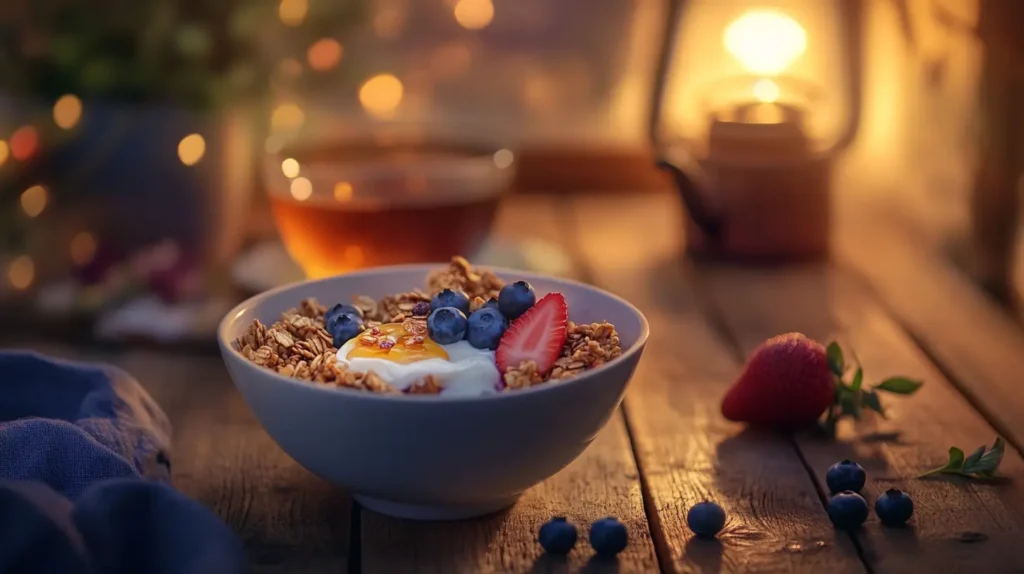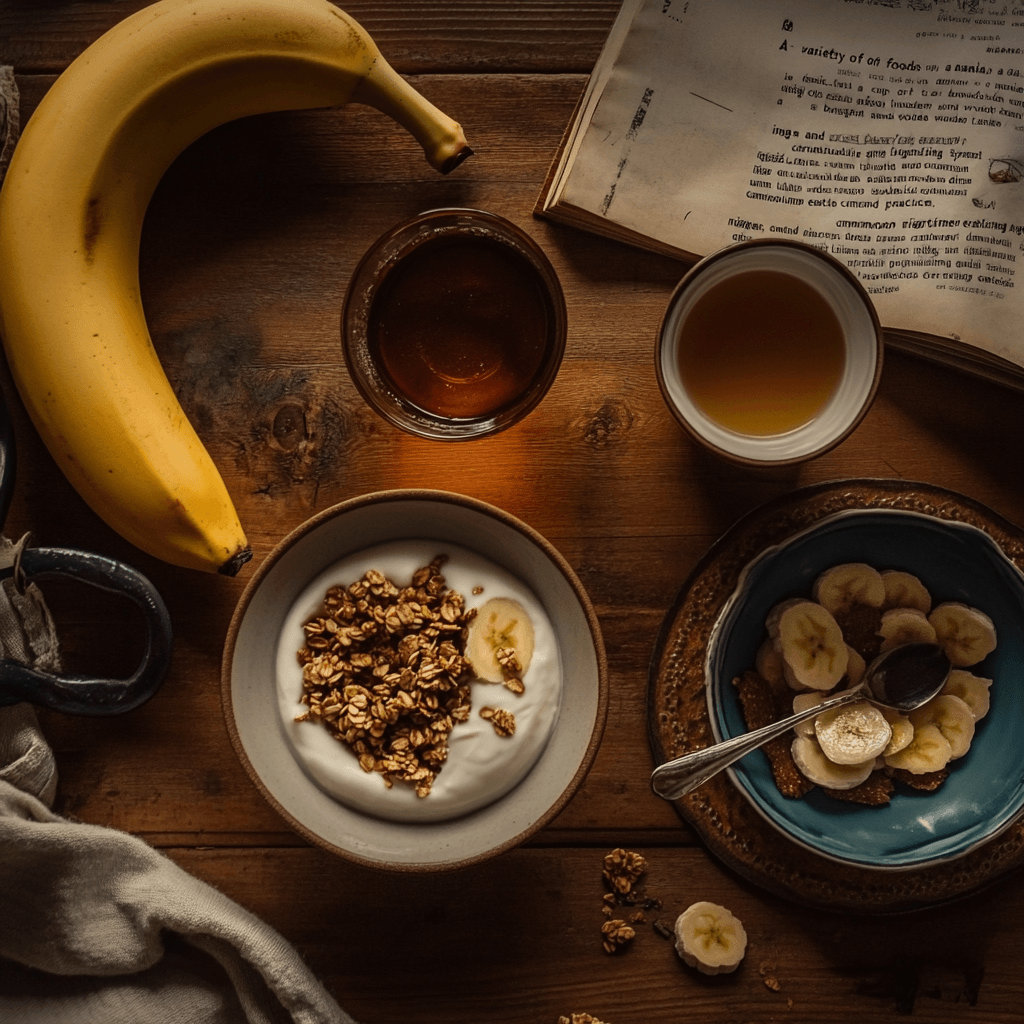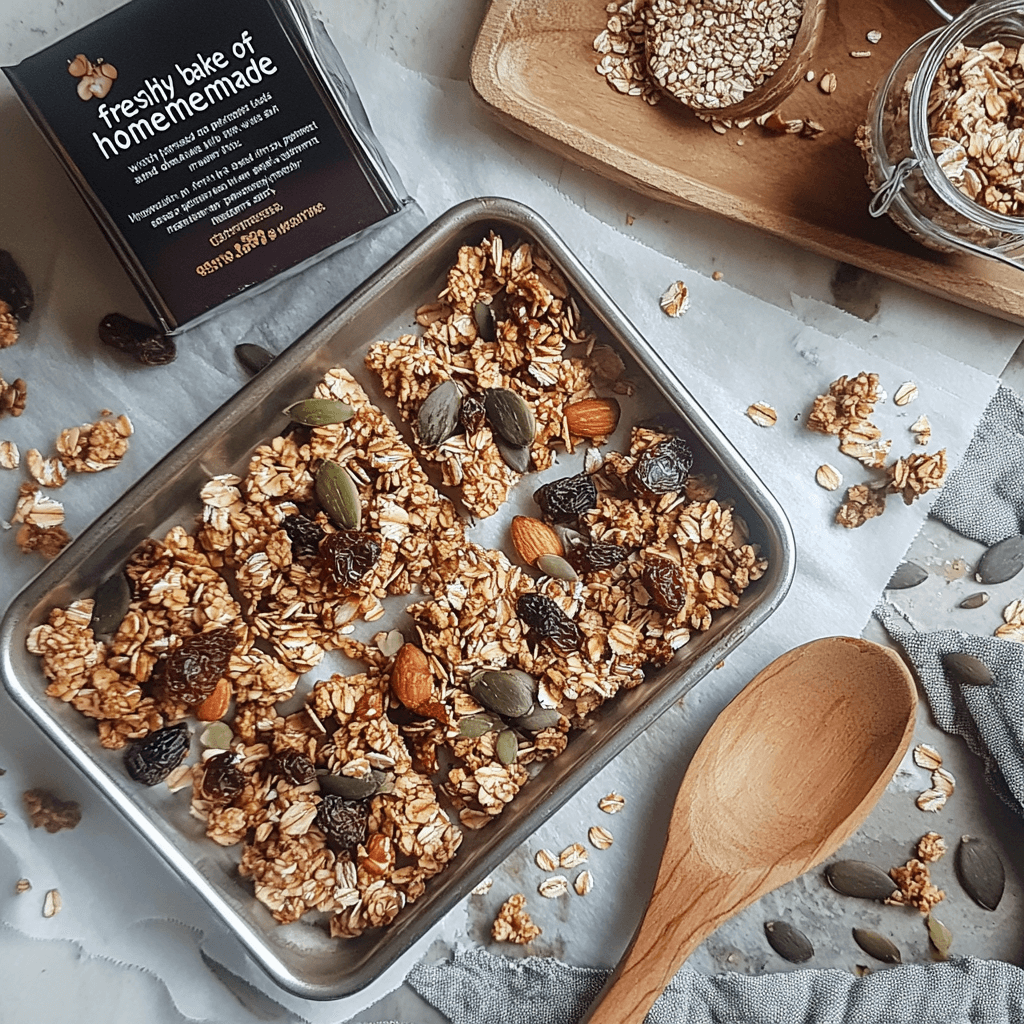Granola as a nighttime snack is a common choice, but its effects on health are often misunderstood. Many people routinely reach for granola as a nighttime snack, influenced by lifestyle, culture, or biological cues. However, this habit is surrounded by myths and debates, particularly regarding its impact on weight, digestion, and sleep. Understanding why people eat at night and how to make smart snack choices—such as granola as a nighttime snack—can provide clarity on this widespread behavior.

Table of Contents
Why Nighttime Eating is a Common Practice
Nighttime eating can stem from a variety of reasons, ranging from physical to emotional factors:
- Lifestyle Influences: Irregular work schedules, late-night study sessions, or social activities often delay meals until later in the evening.
- Biological Factors: Hormonal changes, such as increased levels of ghrelin (hunger hormone), can cause heightened cravings at night.
- Emotional Triggers: Stress, boredom, or using food as a reward at the end of the day are common emotional drivers of nighttime eating.
- Cultural Practices: In some cultures, late-night dinners are a tradition, often tied to social and family gatherings.
These factors highlight the diverse reasons behind nighttime eating, making it a multifaceted behavior that varies from person to person. For those looking for a healthier alternative, granola as a nighttime snack can provide a balanced and nutritious option. Choosing granola as a nighttime snack ensures a satisfying yet wholesome choice, regardless of the underlying reasons for late-night cravings.

Popular Myths and Truths About Eating Late
There are several myths and truths surrounding nighttime eating, particularly about its impact on weight, digestion, and sleep. For instance, while some believe eating late always causes weight gain, the truth is that incorporating a balanced option like granola as a nighttime snack can provide nutrients without leading to overeating. Understanding these myths and opting for wholesome snacks such as granola helps promote better health and dispels common misconceptions.
- Myth: Eating at night always causes weight gain.
- Truth: Weight gain occurs when calorie intake exceeds calorie expenditure, regardless of the time of consumption. However, people may overeat at night, especially if they skip meals earlier in the day.
- Myth: Eating late disrupts digestion and causes poor sleep.
- Truth: Heavy or spicy meals can affect sleep quality, but light, nutrient-dense snacks (like a banana or yogurt) may promote better rest by stabilizing blood sugar levels.
- Truth: Nighttime eating can lead to poor food choices.
- Late at night, individuals are more likely to reach for convenience foods high in sugar, fat, and calories, which can impact overall dietary quality.
- Truth: Timing can influence metabolic processes.
- Some studies suggest that eating late may disrupt circadian rhythms, potentially affecting metabolism and energy regulation.
By addressing the reasons behind nighttime eating and separating myths from truths, individuals can better navigate their eating habits and make informed choices that align with their health goals.
Nutritional Value of Granola Cereal
Granola as a nighttime snack is a nutrient-rich choice that combines a variety of ingredients, offering a balanced profile of macronutrients, vitamins, and minerals. However, due to its calorie density, practicing portion control is essential when incorporating granola as a nighttime snack into a healthy diet.
Macronutrients: Carbs, Proteins, and Fats
Granola provides a balanced mix of macronutrients, making it a satisfying and energy-dense food:
- Carbohydrates:
Granola is primarily composed of carbohydrates, largely from oats and sweeteners. These carbs provide sustained energy, with fiber-rich oats supporting digestive health and helping to regulate blood sugar levels. - Proteins:
While not a high-protein food, granola often contains protein from nuts, seeds, and added ingredients like soy or whey protein in certain varieties. This makes it a good option for a snack that supports muscle repair and satiety. - Fats:
Granola includes healthy fats from nuts, seeds, and oils, which contribute to brain health, hormone production, and overall well-being. These fats are predominantly unsaturated, which are beneficial for heart health.
Vitamins and Minerals Found in Granola
Granola is a good source of essential vitamins and minerals, depending on the ingredients used:
- Iron: Found in oats, nuts, and dried fruits, iron is critical for oxygen transport in the blood and energy production.
- Magnesium: Present in nuts and seeds, magnesium supports muscle function, nerve health, and bone strength.
- Vitamin E: Nuts and seeds contribute vitamin E, an antioxidant that protects cells from oxidative stress.
- Potassium: Dried fruits and nuts add potassium, which is vital for heart health and maintaining fluid balance.
- B Vitamins: Whole grains and seeds in granola supply B vitamins, which aid in energy metabolism and brain function.
Some granola products may be fortified with additional nutrients, such as calcium or vitamin D, to enhance their health benefits. These fortified options make granola as a nighttime snack an even better choice, providing extra support for bone health and overall nutrition while satisfying late-night cravings. Choosing granola as a nighttime snack can help ensure a nutrient-dense option that promotes wellness.
Calorie Count and Portion Considerations
Granola as a nighttime snack is calorie-dense, primarily due to its fat and carbohydrate content. A typical serving size is around 1/4 to 1/2 cup (30–60 grams), providing approximately 120–250 calories. However, portions can vary depending on the brand and recipe, with some granola as a nighttime snack options containing higher amounts of added sugars and oils. Practicing portion control is key to enjoying granola as a nighttime snack without excessive calorie intake.
To enjoy granola without overindulging in calories:
- Stick to the recommended serving size.
- Pair granola with low-calorie, nutrient-rich foods like plain yogurt or fresh fruits to enhance satiety and balance.
- Opt for low-sugar or unsweetened varieties to reduce unnecessary calorie intake.
By understanding granola’s nutritional composition and practicing portion control, it can be a valuable addition to a balanced diet, offering both nourishment and flavor.
Health Benefits of Eating Granola Cereal
Granola as a nighttime snack is not only delicious but also offers numerous health benefits due to its nutrient-rich ingredients. From supporting digestive health to enhancing energy levels, granola as a nighttime snack can be a wholesome addition to a balanced diet, providing sustained nourishment even during late-night cravings.
Promotes Digestive Health
Granola is rich in dietary fiber, primarily from oats, nuts, seeds, and dried fruits, which contribute to a healthy digestive system:
- Improves Bowel Regularity: The soluble and insoluble fiber in granola helps prevent constipation by promoting regular bowel movements.
- Supports Gut Microbiota: Ingredients like oats and dried fruits act as prebiotics, feeding beneficial gut bacteria that play a role in digestion and overall health.
- Reduces Inflammation: The antioxidants in nuts and seeds can reduce inflammation in the gut, supporting a healthier digestive tract.
Consuming granola as part of a fiber-rich diet can help maintain a healthy digestive system and improve overall gut health.
Supports Heart Health
The combination of whole grains, nuts, and seeds in granola provides nutrients that are beneficial for cardiovascular health:
- Lowers Cholesterol: Soluble fiber from oats can help reduce LDL (“bad”) cholesterol levels, which is linked to a lower risk of heart disease.
- Provides Healthy Fats: Nuts and seeds are high in unsaturated fats, which support heart health by improving cholesterol levels and reducing inflammation.
- Rich in Antioxidants: Ingredients like almonds, walnuts, and dried fruits contain antioxidants such as vitamin E, which protect the heart by preventing oxidative damage.
Including granola in a balanced diet can contribute to improved heart health, especially when paired with other heart-friendly foods like fresh fruits and yogurt.
Boosts Energy Levels
Granola is an excellent source of energy, making it a popular choice for breakfast or a pre-workout snack:
- Complex Carbohydrates: The oats in granola provide slow-releasing energy, keeping you fueled and focused for longer periods.
- Protein for Sustained Energy: Nuts, seeds, and protein-enriched granolas supply protein, which helps maintain energy levels and supports muscle repair.
- Micronutrients for Vitality: Granola contains essential vitamins and minerals like magnesium, iron, and potassium, which are crucial for energy production and reducing fatigue.
These energy-boosting properties make granola an ideal option for active individuals, students, or anyone looking for a nutritious start to their day.
FAQs about Eating Granola at Night
Granola as a nighttime snack is often considered a wholesome choice, but questions arise about its impact on health and weight when eaten at night. To better understand the benefits and potential drawbacks of granola as a nighttime snack, here are some frequently asked questions to guide your nighttime snacking choices.
Can Granola Cause Weight Gain if Eaten at Night?
Granola, like any food, can contribute to weight gain if consumed in excess of your daily caloric needs, regardless of the time of day. However, granola itself is not inherently fattening:
- Calorie Density: Granola is calorie-dense due to its mix of oats, nuts, seeds, and sweeteners, so portion control is crucial, especially at night when activity levels are lower.
- Mindful Eating: Eating granola in moderation as part of your total caloric intake is unlikely to cause weight gain. Pairing it with a low-calorie food like plain yogurt or fruit can help keep portions reasonable.
Eating a small, balanced portion of granola at night can be a healthy choice, especially if you are mindful of your overall calorie consumption.
Is Granola Better Than Chips or Cookies Before Bed?
Granola is generally a healthier choice than chips or cookies for a nighttime snack:
- Nutritional Value: Unlike chips and cookies, which are often high in unhealthy fats, sugars, and empty calories, granola contains fiber, healthy fats, and essential nutrients.
- Satiety: Granola’s fiber and protein content can help you feel fuller for longer, reducing the likelihood of overeating compared to chips or cookies.
- Better Sleep: Granola paired with a calming food like milk or a banana may support better sleep by stabilizing blood sugar levels, while sugary or greasy snacks might disrupt sleep quality.
When compared to chips or cookies, granola is a more nutritious and satisfying choice for a pre-bedtime snack.
How Much Granola Is Safe to Eat at Night?
The amount of granola you can safely eat at night depends on your dietary needs and goals:
- Recommended Portion: A typical serving of granola is about 1/4 to 1/2 cup (30–60 grams), which provides around 120–250 calories. This portion is generally appropriate for a nighttime snack.
- Balance: Pair granola with low-calorie, nutrient-rich foods like yogurt or fresh fruit to enhance satiety without adding excessive calories.
- Avoid Overeating: Since granola is calorie-dense, eating straight from the bag can lead to overconsumption. Measure your portion to stay within your desired calorie range.
Expert Opinions on Granola as a Nighttime Snack
Granola as a nighttime snack is a versatile and nutrient-rich choice, but its suitability depends on individual goals and preferences. Here’s what experts, including nutritionists and fitness professionals, have to say about the benefits and considerations of granola as a nighttime snack.
Insights from Nutritionists
Nutritionists generally view granola as a healthier nighttime snack option compared to processed snacks like chips or sugary treats. However, they emphasize moderation and mindful choices:
- Nutrient-Dense but Calorie-Rich: Nutritionists highlight that granola is a concentrated source of energy, containing fiber, healthy fats, and essential vitamins and minerals. However, due to its calorie density, portion control is key, particularly for those looking to manage weight.
- Pairing for Balance: Nutritionists often recommend combining granola with low-calorie, high-protein foods such as Greek yogurt to enhance satiety and provide a balanced mix of macronutrients.
- Timing Matters: For individuals prone to late-night cravings, granola can be a smart choice to satisfy hunger without resorting to unhealthy options. However, it’s best consumed in small portions to avoid disrupting overall caloric balance.
According to nutritionists, granola can be a part of a healthy nighttime routine when eaten thoughtfully and in conjunction with a balanced diet.
Fitness Professionals’ Take on Granola
Fitness professionals often evaluate nighttime snacks based on their impact on recovery, performance, and body composition. Their views on granola reflect these priorities:
- Pre- or Post-Workout Fuel: For individuals exercising in the evening, fitness experts note that granola provides a quick source of energy, replenishing glycogen stores and supporting recovery. Pairing it with a protein source can enhance muscle repair and growth.
- Avoid Overconsumption: Fitness professionals caution against eating large portions of granola at night, as its calorie density could hinder fat-loss goals or disrupt macros for those on strict plans.
- High-Quality Options: Experts suggest choosing granola with minimal added sugars and artificial ingredients, focusing on those that contain whole grains, nuts, and seeds to maximize nutritional benefits.
Conclusion: Is it OK to Eat Granola Cereal at Night?
Granola as a nighttime snack can be a healthy and satisfying choice when consumed mindfully and in moderation. While granola as a nighttime snack offers numerous nutritional benefits, its calorie density and potential for overconsumption require careful consideration to maintain a balanced diet.
Summary of Pros and Cons
Pros:
- Granola is nutrient-dense, offering fiber, healthy fats, and essential vitamins and minerals.
- It can promote satiety, stabilize blood sugar levels, and support sleep when paired with calming foods like yogurt or milk.
- As a healthier alternative to processed snacks, granola provides sustained energy without empty calories.
Cons:
- Granola is calorie-dense and can contribute to weight gain if eaten in large quantities.
- Varieties high in added sugars or unhealthy fats can negate its health benefits.
- Eating too close to bedtime or consuming heavy portions may disrupt digestion and sleep quality.
Practical Tips for Making Granola a Healthy Nighttime Choice

To enjoy granola at night while maximizing its benefits, consider these tips:
- Control Portions: Stick to a serving size of 1/4 to 1/2 cup (30–60 grams) to avoid overindulging. Measuring out your portion can help prevent overeating.
- Pair with Nutrient-Rich Foods: Combine granola with low-fat yogurt, unsweetened almond milk, or a small piece of fruit to create a balanced snack that satisfies hunger without excessive calories.
- Choose Low-Sugar Options: Opt for granola with minimal added sugars and prioritize those made with whole grains, nuts, seeds, and natural sweeteners like honey or maple syrup.
- Time Your Snack: Eat granola at least an hour before bedtime to allow for proper digestion and minimize any potential sleep disturbances.
- Make Your Own Granola: Homemade granola gives you full control over ingredients, allowing you to create a low-calorie, nutrient-rich version tailored to your preferences.
Final Thoughts
Granola as a nighttime snack can be a healthy choice when consumed mindfully. By balancing portion size, ingredient quality, and timing, granola as a nighttime snack provides nutritional benefits without compromising health goals or sleep quality.
